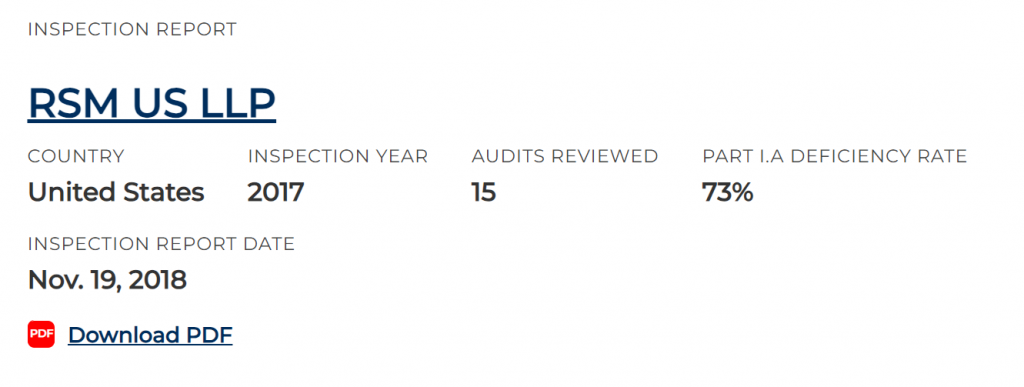The Public Company Accounting Oversight Board (PCAOB) on July 19 unveiled six new search filters on its Firm Inspection Reports page to allow investors, audit committee members, and other stakeholders the ability to analyze and compare data from more than 3,700 inspection reports.
“PCAOB inspection reports provide investors, audit committees, and potential clients with important information they can use to make informed decisions. By making that information easier to find and compare, these new tools will empower users to hold firms accountable for producing high-quality audits,” PCAOB Chair Erica Williams said in a press release.
One of the new online tools gives you the ability to sort inspection reports according to the percentage of audits with Part I.A deficiencies. Part I.A of PCAOB inspection reports “discusses deficiencies, if any, that were of such significance that PCAOB staff believed the audit firm, at the time it issued its audit report(s), had not obtained sufficient appropriate audit evidence to support its opinion on the public company’s financial statements and/or internal control over financial reporting.”
In other words, Part I.A shows how many mistakes and what types of mistakes a firm made during its audits of public companies. For example, let’s say you wanted to see which firms had a deficiency rate of 70% and higher in their auditing report cards. In the box “Part 1.A Deficiency Rate,” you can enter the error rate percentage range (70 and 100 in this case) or use a slide tool to get to that range. As of today, there are 872 inspection reports of firms that had an audit deficiency rate of 70% or worse.

One of the 872 is the 2017 PCAOB inspection report of top five U.S. accounting firm RSM US. During that inspection cycle, the PCAOB reviewed 15 audits of public companies conducted by RSM. The firm got a failing grade on 73% of those audits. The PCAOB provides a link to the inspection report, which shows that RSM made significant errors in 11 of the 15 audits (73.3%) examined.

The other five new inspection report filters are:
- Inspection type: Users can filter according to whether a firm inspection report falls into the “annual” or “triennial” inspection frequency category for the inspection year.
- Total issuer audit clients: Users can now get a better and more immediate sense of the size of triennially inspected audit firms by sorting inspection reports according to the number of audit clients that firms had, as determined at the outset of the inspection.
- Specific global network: Users can now refine search results so they include only firms that belong to a specific global audit firm network.
- Inspection year: Users can now filter inspection reports according to the year that the PCAOB’s inspectors completed the inspection, not just the year when the report was published.
- Audits reviewed: Users can search inspection reports by number of issuer audits that the PCAOB reviewed as part of its inspection.
In addition, users can now download the entire data set into three formats: CSV, XML, and JSON. These three formats maximize the ability of users to integrate PCAOB data into third-party applications for further analysis.
“Each year, the hard work of the PCAOB’s inspection staff yields an extraordinary amount of useful information for investors and others,” said George R. Botic, director of the PCAOB’s Division of Registration and Inspections. “We are strongly committed to making more of this information more accessible and insightful for PCAOB stakeholders, and we are pleased that today’s website enhancements further that commitment.”
Thanks for reading CPA Practice Advisor!
Subscribe Already registered? Log In
Need more information? Read the FAQs




